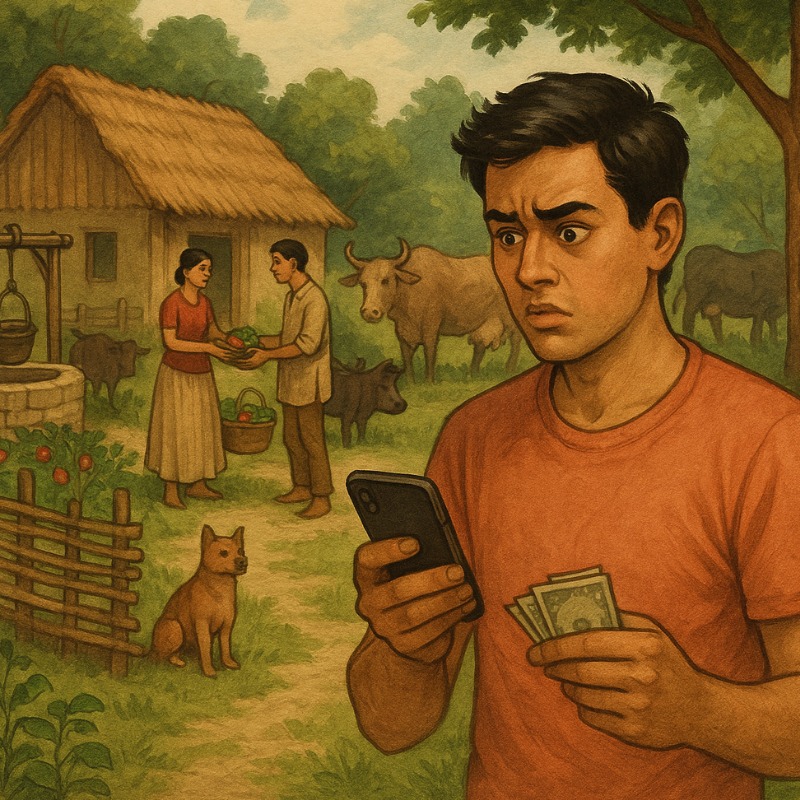Raghu woke up with a start. His body was lying on soft, dewy grass, and the air around him smelled of wet earth, wildflowers, and smoke from a distant wood fire. The sky above was a brilliant canvas of blue, unmarred by planes or pollution. Confused, he reached for his phone instinctively, but the screen remained black. No signal. No battery.
He stood up and looked around. There were no roads. No cars. No buildings. Just small thatched homes, spaced apart with fenced gardens and a few animals wandering lazily about. A group of villagers, dressed in simple, earth-toned clothes, moved with calm purpose—some carrying baskets of vegetables, others fetching water from wells in their own yards.
“What kind of place is this?” he muttered.
Raghu’s last memory was of falling asleep after a long day at work. He had been swiping through social media while simultaneously checking crypto prices and planning an upgrade for his phone. Now, nothing made sense. He started walking, hoping to find someone who could give him answers.
A dog trotted up to him, tail wagging. The animal looked well-fed and friendly. Not long after, a woman appeared from one of the houses, holding a wooden bowl.
“You’re new here,” she said gently, as though she had been expecting him. “Come. You must be hungry.”
Raghu, unsure of what else to do, followed her.
Inside the house, the aroma of herbs and freshly cooked food filled the air. The kitchen had no gas stove, no refrigerator, not even a single switch on the walls. Clay pots, wooden spoons, and dried herbs hanging from the ceiling gave the space a warm, ancient feel.
“Where… where is this?” Raghu asked as he sipped a bowl of hot broth.
“We call it the Common Earth,” she said with a smile. “There’s no money here. No machines. But everything you need to live is here.”
Raghu scoffed. “No money? How do people survive?”
“We barter. We grow what we need. Share what we can.”
Over the next few days, Raghu stayed in the village, unable to find any way back. Each home had its own little piece of land—fenced and neat—with wells for water, small plots for vegetables and fruit trees, two or three cows or buffaloes for milk, and a few dogs and cats for companionship. Villagers would gather firewood from the nearby forest, and herbs from the wild were used as medicine.
There were no banks, no stores, no vehicles, no Wi-Fi. And yet, people were happy. Children played in the fields. Elders told stories by the fire. Music filled the evenings—handmade flutes and drums, and soft songs about the stars and the rain.
Raghu, however, felt out of place. He tried to offer his dead phone to a child, explaining what it could do. The child smiled and asked, “But does it play with you?”
He talked about money, luxury, and the internet. The villagers listened patiently, nodding, then asked, “But if all that made life easier, why do people there look so tired?”
It frustrated him. Back home, he was somebody. He had savings, gadgets, a good job. Here, none of that mattered.
Still, he began to help—at first just to pass the time. He watered plants. He helped a young boy build a new fence. He milked a buffalo and was startled at how proud he felt when he managed it without spilling. Slowly, his days started feeling fuller—not busier, but fuller. He began waking up with the sun, sleeping peacefully by moonlight. His body felt lighter, his breath deeper. He laughed more often. He listened more deeply.
One evening, he sat by the communal fire. An old man was speaking, his voice calm and deliberate.
“We don’t run behind things. We wait for what we need. And because of that, we always have enough.”
Raghu stared into the flames. Enough. The word hit him harder than he expected.
He thought of his old life—racing from one goal to another, earning for things he barely used, surrounded by noise but starved for peace. He had measured success with possessions and status. But here, people measured their lives in shared meals, laughter, and silence under the stars.
A few days later, Raghu helped an elderly woman who had slipped near the forest edge. He brought her home, cleaned her wounds with herbal paste, and stayed by her side until she was well. She called him “son” and gave him a handful of wild honey in return.
He didn’t realize it then, but in that moment, something had shifted.
He no longer felt superior. He felt grounded.
Weeks passed. One morning, Raghu stood at the edge of the forest, looking out at the world he had come to love. The phone in his pocket was still dead, but he no longer felt the need to charge it. He realized he hadn’t thought about money in days. And for the first time in years, he wasn’t anxious about the future.
He wasn’t sure how, but he eventually woke up in his own bed again. Back in the city. The noise, the lights, the screens—all waiting for him.
He sat up slowly, reached for his phone, then paused. His fingers hovered over the power button. And then he smiled—a quiet, knowing smile—and set it down.
The screen stayed black.
Instead, Raghu walked to the window, opened it wide, and breathed in the morning.
Somewhere deep within, a seed had taken root.
He had learned what it meant to have enough.



 React
React
 React
React
 React
React
 React
React
 React
React